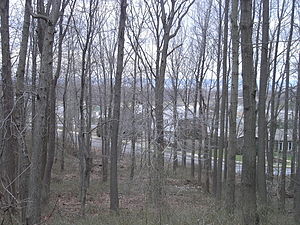Todt Hill
This article needs additional citations for verification. (December 2008) |

Lua error in Module:Location_map at line 526: Unable to find the specified location map definition: "Module:Location map/data/New York Staten Island" does not exist.
Todt Hill (pronounced TOTE [1]) is a 401-foot-tall (122 m) hill formed of serpentine rock on Staten Island, New York. It is the highest natural point in the five boroughs of New York City and the highest elevation on the entire Eastern Seaboard from Florida to Cape Cod.[2] The summit of the ridge is largely covered in woodlands as part of the Staten Island Greenbelt, although much of the surrounding area is developed and residential.[3] It is considered one of the most exclusive and most expensive areas of Staten Island.[4]
History
The name Todt comes from the Dutch language word for "dead" and may refer to the cemetery (the present Moravian Cemetery, opened in 1740 and now the island's largest cemetery[5]) on the southwestern foot of the ridge near the town of New Dorp that has been in use since colonial days. An alternate explanation is that the name was given by early Dutch settlers because of treeless rocky exposures on the hilltop.[6]
At the beginning of the 20th century, many houses designed by the architect Ernest Flagg were built in the area. A significant part of Todt Hill is now included in the Staten Island Greenbelt.
Geography
The term Todt Hill is now often used to include the upscale developments in the hills along the eastern side of the ridge, which most island geographers classify as part of the neighborhood of Dongan Hills.
Two small, natural ponds are found on Todt Hill, and a Roman Catholic priory is located near the summit. Staten Island Academy, a private school, moved its campus to Todt Hill in the 1960s. There is a golf course adjoining the Moravian Cemetery, each of which has a man-made pond. Otherwise the hill is either parkland or private homes. There is no public transit available on Todt Hill, and most of the streets, including Todt Hill Road, the neighborhood's main thoroughfare, lack sidewalks.
Demographics
Todt Hill consists of the two census tracts 177 and 181 (though census tract 177 incorporates part of Emerson Hill). According to the 2010 census,[7] the demographics of Todt Hill were 80% non Hispanic White, 1% Black, 11% Asian, and 1% Multiracial. Hispanics of any race made up 7% of the population. The median household income of the area is roughly $120,000. Todt Hill is one of Staten Island's most affluent areas.
As of 2011, the population of the district is about 11,000 inhabitants. The population density was approximately 1,400 people per square kilometer.[8]
Notable residents
- The late Gambino crime family boss Paul Castellano lived there, in a house noted for its intended resemblance to the White House. His family lived on Todt Hill as well, but moved in 2005.
- Mob Wives reality television star, Drita D’avanzo, grew up in the Todt Hill Houses.[9]
- Former New York Mets relief pitcher John Franco currently lives on the hill.
- The Corleone family compound from The Godfather was filmed on Todt Hill.
- Frank Matthews, a notorious drug kingpin in the 1970s, lived on Todt Hill.
Transportation
As of December 2014, bus routes S74, S76, S84, S86, X15 operate in Todt Hill.[10]
References
- ^ [1]
- ^ Sanderson, Eric (2009). Mannahatta A Natural History of New York City. Harry N. Abrams. pp. 83–84.
- ^ www.library.csi.cuny.edu
- ^ [2]
- ^ Douglas Keister (2011). Stories in Stone New York: A Field Guide to New York City Area Cemeteries and Their Residents. Gibbs Smith. pp. 177, 256. ISBN 1423621026.
- ^ Staten Island Serpentinite
- ^ http://projects.nytimes.com/census/2010/map?hp
- ^ "Todt Hill neighborhood in Staten Island, New York (NY)". city- data.com. Retrieved 2014-12-29.
- ^ Andrea Boyarsky (April 8, 2011). "New television show 'Mob Wives' follows four Staten Island women and their lifestyles". SILive.com. Staten Island Advance. Retrieved June 8, 2011.
- ^ "Staten Island Bus Map" (PDF). mta.info. Retrieved 2014-12-29.
- Jackson, Kenneth T., ed. (2010). The Encyclopedia of New York City (2nd ed.). New Haven: Yale University Press. ISBN 978-0-300-11465-2.

